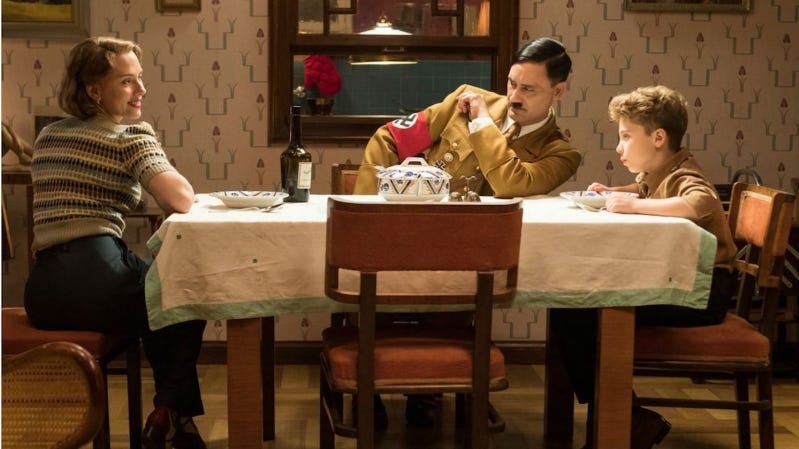A WWII satirical fable that puts heart over farce

We live in a political era where cruelty and ineptitude seem to go hand in hand, stoking division and hatred. Perfect fodder for filmmakers to skewer, as they have long done, from Chaplin’s 1940s effort The Great Dictator, Mel Brooks’ The Producers (1967), to more recent fare such as Armando Iannucci’s The Death of Stalin. Adding to these is Taika Waititi (The Hunt for the Wilderpeople, Thor Ragnarok) with a coming of age satire, set amidst the horrors of World War II, that reminds us it’s totally ok to punch a Nazi.
Near the close of WWII, Jojo Betzler (Roman Griffin Davis) is about to step up and do his part. With his father away fighting, and being raised by his mother Rosie (Scarlett Johansson), he has reached the age of 10 and is preparing to go to camp, an event marking his entry to the Hitler youth movement. An incident with a grenade means he is pulled from school and instead spends his time recovering at home, or assisting the local militia. It is in this time he discovers a secret: his mother has been hiding a young Jewish girl named Elsa (Thomasin Harcourt McKenzie) in the walls of their home. Programmed to despise her, and fearful for the repercussions of her discovery, he begins to struggle with his innate kind nature and the ideals of his country. The former are championed by his mother, the latter by his imaginary best friend, Adolf Hitler (Taika Waititi).

Based on Caging Skies, a novel by Christine Leunens, Jojo Rabbit feels like Waititi picked up the precocious kids from Moonlight Kingdom, only instead of heading to a scout expedition, they’re dropped into an event to indoctrinate them into the Third Reich, learning about the evils of the Jews, receiving Nazi propaganda spiels and master race championing, indulging in a celebratory book burning, and weapons training. It’s here we start to glimpse the portrayal of the Nazis in a more ridiculous light, satirical moments that feel reminiscent of a Mel Brooks or Chris Morris venture. For the Brits out there, you’ll have flashbacks to the BBC show ‘Allo ‘Allo. These training moments are also where we start to see the doubt and decency in Jojo come to the fore and really take hold of the film. Jojo Rabbit isn’t a wild satirical swing at Hitler, it’s an intimate tale of one boy’s moral reckoning through his burgeoning relationship with this young Jewish girl. Two injured souls, brokering an understanding of each other, each trying to survive, and learning about themselves in the process.
What should be obvious by now is how much the film rests on the shoulders of its young cast, and boy do they deliver. Roman Griffin Davis is endearing and empathetic as a boy deprived of his childhood and of his father. McKenzie (stellar in Leave No Trace) delivers a performance brimming with strength and tenderness, sorrow and loss. The way she uses her words, face, and body language is wondrous and feeds beautifully into the ongoing game of cat and mouse with Jojo. Despite her ongoing ability to accumulate negative press, Scarlett Johansson delivers a reminder as to her talents in a very tricky role, treading a fine line as a melancholic mother striving to not alienate her son by openly opposing the ideals he is being force fed, but rather using warmth and wit to try and shake the fog of Nazi beliefs from her son’s mind. Sam Rockwell, Rebel Wilson, and Alfie Allen all bring Nazi caricatures to the party to contrast some of the darker elements and show the increasingly slapdash scramble of an empire in its final throes. Archie Yates, as Jojo’s friend Yorki, deserves special mention too, as one of the most adorable scene stealers you’re likely to behold. Finally we come to Taika himself, portraying Hitler as a childlike figure, prone to occasional outbursts brimming with menace, before returning to his petulant ways. The addition of this character as a hook is understandable, as is his function as a crutch for Jojo every time he needs reassurance, or starts to waver in his Nazi convictions, and as an ethical counterweight to Jojo’s mother. While he delivers some of the biggest laughs of the film, at times you might wonder if the film might be stronger without the tonal wobbles he brings.
What’s undeniable is how much of a technical step forward the film is for Waititi, fusing the irreverent humor of What We Do In The Shadows and the charming heart of Hunt For The Wilderpeople with a greater assuredness behind the camera. As a satire, the film does lack a raw punch, but Jojo Rabbit is less concerned with eviscerating Nazi ideals and more about championing innate human kindness. A silly, sincere, bleak, and surprisingly wistful tale where love trumps hate in a tug of war over the soul of a young boy.



